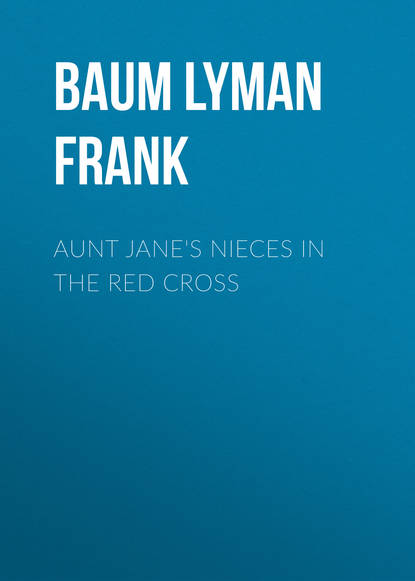По всем вопросам обращайтесь на: info@litportal.ru
(©) 2003-2025.
✖
Aunt Jane's Nieces in the Red Cross
Настройки чтения
Размер шрифта
Высота строк
Поля
"No."
"Then I cannot see that you lack nerve," said the little Belgian thoughtfully. "I was watching you to-day, M'sieur Doctor, and I believe what you lack is courage."
Gys stared so hard at him with the one good eye that even Maurie became embarrassed and turned away his head. Sipping his tea and brandy he presently resumed, in a casual tone:
"Never have I indulged in work of more interest than this. We go into the thick of the fight, yet are we safe from harm. We do good to both sides, because the men who do the fighting are not to blame for the war, at all. The leaders of politics say to the generals: 'We have declared war; go and fight.' The generals say to the soldiers: 'We are told to fight, so come on. We do not know why, but it is our duty, because it is our profession. So go and die, or get shot to pieces, or lose some arms and legs, as it may happen.' The business of the soldiers is to obey; they must back up the policies of their country, right or wrong. But do those who send them into danger ever get hurt? Not to the naked eye."
"Why, you're quite a philosopher, Maurie," said Patsy.
"It is true," agreed the Belgian. "But philosophy is like courage – easy to assume. We strut and talk big; we call the politicians sharks, the soldiers fools; but does it do any good? The war will go on; the enemy will destroy our homes, separate our families, take away our bread and leave us to starve; but we have the privilege to philosophize, if we like. For myself, I thank them for nothing!"
"I suppose you grieve continually for your wife," said Patsy.
"Not so much that, mamselle, but I know she is grieving for me," he replied.
"As soon as we find time," continued the girl, "we intend to search for your wife and children. I am sure we can find them for you."
Maurie moved uneasily in his chair.
"I beg you to take no trouble on my account," said he. "With the Red Cross you have great work to accomplish. What is the despair of one poor Walloon to you?"
"It is a great deal to us, Maurie," returned the girl, earnestly. "You have been a friend in need; without you we could not have made our dash to the front to-day. We shall try to repay you by finding your wife."
He was silent, but his troubled look told of busy thoughts.
"What does she look like?" inquired Beth. "Have you her photograph?"
"No; she would not make a good picture, mamselle," he answered with a sigh. "Clarette is large; she is fat; she has a way of scowling when one does not bring in more wood than the fire can eat up; and she is very religious."
"With that description I am sure we can find her," cried Patsy enthusiastically.
He seemed disturbed.
"If you please," said he plaintively, "Clarette is quite able to take care of herself. She has a strong will."
"But if you know she is safe it will relieve your anxiety," suggested Beth. "You told us yesterday you had been searching everywhere for her."
"If I said everywhere, I was wrong, for poor Clarette must be somewhere. And since yesterday I have been thinking with more deliberation, and I have decided," he added, his tone becoming confidential, "that it is better I do not find Clarette just now. It might destroy my usefulness to the Red Cross."
"But your children!" protested Patsy. "Surely you cannot rest at ease with your two dear children wandering about, in constant danger."
"To be frank, mamselle," said he, "they are not my children. I had a baby, but it was killed, as I told you. The boy and girl I have mentioned were born when Clarette was the wife of another man – a blacksmith at Dinant – who had a sad habit of beating her."
"But you love the little ones, I am sure."
He shook his head.
"They have somewhat the temper of their father, the blacksmith. I took them when I took Clarette – just as I took the silver spoons and the checkered tablespread she brought with her – but now that a cruel fate has separated me from the children, perhaps it is all for the best."
The doctor gave a snort of disgust, while Ajo smiled. The girls were too astonished to pursue the conversation, but now realized that Maurie's private affairs did not require their good offices to untangle. Uncle John was quite amused at the Belgian's confession and was the only one to reply.
"Fate often seems cruel when she is in her happiest mood," said he. "Perhaps, Maurie, your Clarette will come to you without your seeking her, for all Belgium seems headed toward France just now. What do you think? Will the Germans capture Dunkirk?"
The man brightened visibly at this turn in the conversation.
"Not to-day, sir; not for days to come," he replied. "The French cannot afford to lose Dunkirk, and by to-morrow they will pour an irresistible horde against the German invader. If we stay here, we are sure to remain in the rear of the firing line."
CHAPTER X
THE WAR'S VICTIMS
While the others were conversing on deck Maud Stanton was ministering to the maimed victims of the war's cruelty, who tossed and moaned below. The main cabin and its accompanying staterooms had been fitted with all the conveniences of a modern hospital. Twenty-two could easily be accommodated in the rooms and a dozen more in the cabin, so that the eleven now in their charge were easily cared for. Of these, only three had been seriously injured. One was the German, who, however, was now sleeping soundly under the influence of the soothing potion that followed his operation. The man's calmness and iron nerve indicated that he would make a rapid recovery. Another was the young Belgian soldier picked up in the roadway near the firing line, who had been shot in the back and had not yet recovered consciousness. Dr. Gys had removed several bits of exploded shell and dressed the wound, shaking his head discouragingly. But since the young man was still breathing, with a fairly regular respiration, no attempt was made to restore him to his senses.
The third seriously injured was a French sergeant whose body was literally riddled with shrapnel. A brief examination had convinced Gys that the case was hopeless.
"He may live until morning," was the doctor's report as he calmly looked down upon the moaning sergeant, "but no longer. Meanwhile, we must prevent his suffering."
This he accomplished by means of powerful drugs. The soldier soon lay in a stupor, awaiting the end, and nothing more could be done for him.
Of the others, two Belgians with bandaged heads were playing a quiet game of écarté in a corner of the cabin, while another with a slight wound in his leg was stretched upon a couch, reading a book. A young French officer who had lost three fingers of his hand was cheerfully conversing with a comrade whose scalp had been torn by a bullet and who declared that in two days he would return to the front. The others Maud found asleep in their berths or lying quietly to ease their pain. It was remarkable, however, how little suffering was caused these men by flesh wounds, once they were properly dressed and the patients made comfortable with food and warmth and the assurance of proper care.
So it was that Maud found her duties not at all arduous this evening. Indeed, the sympathy she felt for these brave men was so strong that it wearied her more than the actual work of nursing them. A sip of water here, a cold compress there, the administration of medicines to keep down or prevent fever, little attentions of this character were all that were required. Speaking French fluently, she was able to converse with all those under her charge and all seemed eager to relate to their beautiful nurse their experiences, hopes and griefs. Soon she realized she was beginning to learn more of the true nature of war than she had ever gleaned from the correspondents of the newspapers.
When dinner was served in the forward cabin Beth relieved Maud and after the evening meal Dr. Gys made another inspection of his patients. All seemed doing well except the young Belgian. The condition of the French sergeant was still unchanged. Some of those with minor injuries were ordered on deck for a breath of fresh air.
Patsy relieved Beth at midnight and Maud came on duty again at six o'clock, having had several hours of refreshing sleep. She found Patsy trembling with nervousness, for the sergeant had passed away an hour previous and the horror of the event had quite upset the girl.
"Oh, it is all so unnecessary!" she wailed as she threw herself into Maud's arms.
"We must steel ourselves to such things, dear," said Maud, soothing her, "for they will be of frequent occurrence, I fear. And we must be grateful and glad that we were able to relieve the poor man's anguish and secure for him a peaceful end."
"I know," answered Patsy with a little sob, "but it's so dreadful. Oh, what a cruel, hateful thing war is!"
From papers found on the sergeant Uncle John was able to notify his relatives of his fate. His home was in a little village not fifty miles away and during the day a brother arrived to take charge of the remains and convey them to their last resting place.
The following morning Captain Carg was notified by the authorities to withdraw the Arabella to an anchorage farther out in the bay, and thereafter it became necessary to use the two launches for intercourse between the ship and the city. Continuous cannonading could be heard from the direction of Nieuport, Dixmude and Ypres, and it was evident that the battle had doubled in intensity at all points, owing to heavy reinforcements being added to both sides. But, as Maurie had predicted, the Allies were able to hold the foe at bay and keep them from advancing a step farther.
Uncle John had not been at all satisfied with that first day's experience at the front. He firmly believed it was unwise, to the verge of rashness, to allow the girls to place themselves in so dangerous a position. During a serious consultation with Jones, Kelsey, Captain Carg and Dr. Gys, the men agreed upon a better plan of procedure.
"The three nurses have plenty to do in attending to the patients in our hospital," said Gys, "and when the ship has its full quota of wounded they will need assistance or they will break down under the strain. Our young ladies are different from the professional nurses; they are so keenly sensitive that they suffer from sympathy with every patient that comes under their care."
"I do not favor their leaving the ship," remarked Dr. Kelsey, the mate. "There seems to be plenty of field workers at the front, supplied by the governments whose troops are fighting."
"Therefore," added Jones, "we men must assume the duty of driving the ambulances and bringing back the wounded we are able to pick up. As Maurie is too stiff from his wound to drive to-day, I shall undertake the job myself. I know the way, now, and am confident I shall get along nicely. Who will go with me?"
"I will, of course," replied Kelsey quietly.
"Doctor Gys will be needed on the ship," asserted Uncle John.

















